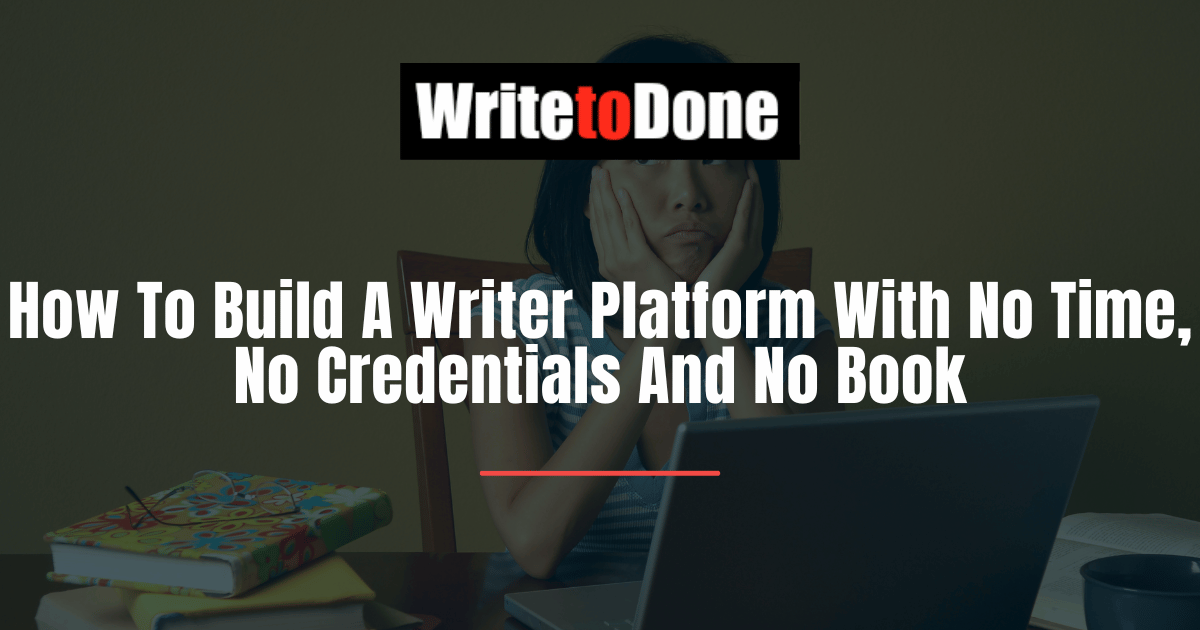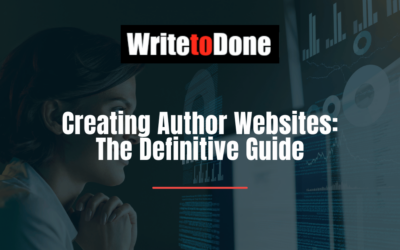Here’s the truth: Every writer needs to know how to build a writer platform.
Are you a writer who is overwhelmed by the rapidly changing industry?
The more adventurous among you are ready for the challenge of building a writer platform and growing your community – but have absolutely no idea where to start.
Some of you find it slightly horrifying that you are required to write and hock your wares, but are prepared to do the work, however distasteful it is.
And a few of you are gnashing your teeth, insisting it was much better in the “good ol’ days” when writers were expected to write – and someone else handled the smarmy promotional bits.
Looking around, you feel a bit deflated. You see authors with several books out, who have all manner of credentials to their name, and platforms as big as those of a rockstar. How can a newbie writer compete?
You have a huge advantage over other writers
Right now, at this very moment, you have a massive lead over many others, whether they are just starting out, or have already been published.
Do you know what it is?
Timing.
The fact that you are aware of the importance of a platform before you’ve even written your first book is big. And if you actually start working on your platform now, growing your audience and influence as you write – before the book deal, before the launch– your “competition” becomes irrelevant.
Obscurity is the disease, your author website is the cure
Your biggest problem is not other writers or other comparable books in your genre; it’s obscurity.
People can’t read a book they’ve never heard of. People won’t buy a book they don’t know exists.
This problem isn’t exclusive to writers. Anybody with something to share – a product, an idea, a message – needs to find a way to get it in front of the people who care.
How you do that varies, but all your actions taken together form the act of building a platform.
Your writer platform, in essence, is the variety of ways you use to connect to – and engage with – the ideal readership that is receptive to your work.
It’s also the amount of influence you wield, the level of visibility and authority you’ve gained, and the depth of your connection with your readers.
Rather than thinking of your platform as a stage from which you talk at your audience, think of your platform as a bridge – a way to connect or close the gap between you and your fans. A way to talk with them.
By starting early, you give yourself the time to develop an authentic two-way connection with your growing fan base. You also give yourself the opportunity to establish a strong foundation on which to build your writing career.
With no time and nothing to offer, how can I build my platform?
Let’s address your specific concerns.
#1. No Time
Starting something new always requires more time, more energy and more upfront effort than doing the same old thing. Anybody who has learned to drive a car, started a new job, or had a baby has experienced this.
So be prepared to accept and deal with the natural overwhelm and time expenditure that comes with establishing your new writing career.
Your work is worth it. Commit to it. Give it the time in your schedule that it deserves. What isn’t a priority doesn’t get done, so if you expect results, make sure you’re allotting time for the actions that will get you there.
Remember, your job is two-fold: create something brilliant, and then get it into the hands of the people who can recognize its brilliance. Just as you wouldn’t plan to open a restaurant without a chef, don’t write a book without a plan to help people read it.
Get ready to step outside your comfort zone and live there for a while. It will get easier, as most things do, but you’ll need to put in the time and effort first. Stop treating your writing like a side gig or it will remain so.
Share just how big your goals are. Don’t keep them a secret. Write them out, tell your family, friends and peers. You might be surprised at the support you get when they see your commitment.
The bottom line is: no time equals no career. It’s really that simple.
#2. No Credentials
Everybody has to start somewhere.
As with your writing, it’s only by doing that you get better, so instead of worrying about proving your credibility, focus on earning credibility by providing useful content to your audience.
Do this by getting to know your target audience inside and out. Discover what they need, want and value. What are their interests? Who are they influenced by?
Skip this step, and your job becomes much more difficult. Nail it, and you’ll never be at a loss for interesting, valuable content.
By providing content that your readers crave, you get people to buy into “brand you.” Your early supporters – those who see the diamond in the rough – often become invested (and sometimes pivotal) in your future success.
You have value, and what you do matters. Practice selling your value now – to yourself and to others. Know what you can bring to the table, and own it.
Start building relationships with other writers, bloggers and industry influencers. Add to the conversations on their blogs and on the social media platforms they’re active on. Share or review their work when appropriate. Take a minute to reach out and let them know you’re a fan of the work they’re doing. People will notice.
Your platform is where you can start building the relationships, the authority, the testimonials and even the “numbers” that endorse the quality of your work. So get started.
#3. No Book
“How do I build a writer platform when I don’t even have a book to sell yet?”
When writers ask me this question, I know I haven’t made something uber clear: Your platform is about connection, not selling.
Selling more books, amplifying your message, extending your reach and influence – these are all positive, natural “consequences” of creating a strong platform, but it’s the connection that is the real asset.
Building relationships over time, earning trust and showing genuine interest in your community is what allows you to influence your audience’s actions (to purchase your book, to share your posts, to spread your ideas, and so on).
That’s why starting early is so important: trust can’t be rushed or expedited.
It is also why not having a book published yet is somewhat irrelevant. You need to be absolutely clear on what it is you have to share (define your author brand) and identify the group that will benefit from it the most (your ideal audience).
Another plus to creating this targeted community is that you can get valuable feedback and insights on your projects before you publish or present them to an agent.
You can gauge reader interest, gather feedback on works in progress, and ask questions to ensure you “get” your reader.
Should you incorporate every idea and bit of feedback into your writing?
Nope. It’s your work, you decide. But learning what your readers want, the words they use to ask for it, and even where they go to find it, will make marketing your book – when you do publish – infinitely easier.
Time to get started
It should be clear by now that all you need to build a writer platform is commitment, patience and perseverance.
And since there is a huge advantage in starting early, there’s no better time than now to take the plunge. Here’s how to start:
1. Know yourself and know your audience. Define your author brand. Do the research to identify your ideal reader. Who exactly are you trying to reach?
2. Set up your author website and start building your email list. For more on how to do this, check out this full free guide to starting your author website.
3. Get social on social media. Determine where your target audience hangs out online, and be there.
If the horror of having to “sell” your own work hasn’t abated, here’s what you need to do: reframe your thoughts on platform, marketing and self-promotion.
At the core, you are simply finding ways to engage with people who are most inclined to love your work. It only gets icky when the effort and engagement isn’t genuine, so focus on relationships, not selling.
When you’re square with this, follow the advice above on getting started.
Over to you
If you’re still reading, but unconvinced that things are better now than they were in the “old days,” here’s my take: like it or not, the industry has changed.
Writers can choose to capitalize on these changes, and learn to approach their careers from both the creative and business sides.
Or they can continue to bemoan their circumstances and get left behind.
Which path will you choose? (Personally, I’ll take too much responsibility over too little control any day of the week.)
So don’t wait for perfect. Don’t wait for more time, more credentials or until your book is published. Don’t get lost in obscurity. Seize the advantage that starting early affords.
People deserve to experience the work that you create.
What has been your experience with building your writer platform? Share your tips and challenges in the comments!

















